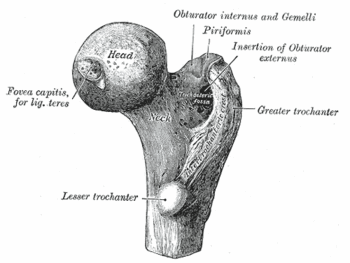Femur: Difference between revisions
Jump to navigation
Jump to search

imported>Meg Taylor (subpages) |
Pat Palmer (talk | contribs) (WPAttribution) |
||
| (3 intermediate revisions by 2 users not shown) | |||
| Line 1: | Line 1: | ||
{{subpages}} | {{subpages}} | ||
In | |||
In anatomy, the '''femur''', or '''thigh bone''', is the only bone in the human [[thigh]]. The thigh is the region of the lower limb between the hip and the knee. In many four-legged animals, the femur is the upper bone of the hind leg. | |||
The top of the femur fits into a socket in the pelvis called the hip joint, and the bottom of the femur connects to the shinbone (tibia) and kneecap (patella) to form the knee. In humans the femur is the largest and thickest bone in the body. | |||
{{Image|Bartleby-image243.gif|right|350px|Upper right femur viewed from behind and above.}} | {{Image|Bartleby-image243.gif|right|350px|Upper right femur viewed from behind and above.}} | ||
==Attribution== | |||
{{WPAttribution}} | |||
==References== | ==References== | ||
{{reflist}} | |||
Latest revision as of 19:21, 25 March 2024
In anatomy, the femur, or thigh bone, is the only bone in the human thigh. The thigh is the region of the lower limb between the hip and the knee. In many four-legged animals, the femur is the upper bone of the hind leg.
The top of the femur fits into a socket in the pelvis called the hip joint, and the bottom of the femur connects to the shinbone (tibia) and kneecap (patella) to form the knee. In humans the femur is the largest and thickest bone in the body.
Attribution
- Some content on this page may previously have appeared on Wikipedia.
